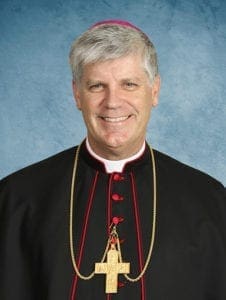An invitation to prayerfully consider prison ministry
By BISHOP BERNARD E. SHLESINGER III, Commentary | Published August 5, 2021 | En Español
“When did we see you sick or in prison and go to visit you?” (Mt 25:39)
“Shelter in place” has impacted the lives of all of us during the pandemic but has been more profoundly felt by those who live in facilities, such as hospitals, assisted living centers and prisons. Within the geographical boundaries of the Archdiocese of Atlanta, there are more than 230 facilities of incarceration, 32 run by the Department of Corrections, two federal and 196 county and city jails.

Bishop Bernard E. Shlesinger III
Many who live in these facilities may unfortunately never receive a visit from a priest, deacon, religious or lay Catholic minister. One obvious reason for this is the restriction of visitors due to a possible outbreak of COVID-19 within a facility. Prior to the pandemic the major reason for the lack of visitation was due to not enough trained Catholic volunteers who could be badged to minister to the incarcerated.
As our prisons prepare to enter into a post-pandemic era and allow for visitors from the outside, Father Kevin Peek has been assigned the task of coordinating the ministry of the few clergy, religious and laity already dedicated to prison ministry. But more importantly, Father Peek will be working with pastors in encouraging volunteers for this ministry from our parishes.
The development of teams that are more localized to the prisons and jails seems the best solution to reaching more of our brothers and sisters living in a different kind of gated community. I ask you, the reader of this column, to prayerfully consider how you might become involved in prison ministry and to consult with your pastor who can forward your name to Father Peek.
Prison ministry involves more than visitation and the giving of the sacraments. Our brothers and sisters who are “sheltered in place” should experience remotely the love of a parish community through letters or cards. The goal of prison ministry must be directed at inclusivity in parish life rather than thinking of them as exclusive from it and relegated to the responsibility of some department within the church. We cannot allow someone who is “out of sight” to be “out of our hearts.” Love must go beyond the prison bars to those who live in a “gated community.”
The story of the rich man (Lk 16:19-21) who dined sumptuously while the poor man Lazarus laid at his gate should challenge all of us to ensure that no one person is left out or is unattended in their needs. Will we go beyond the gates that keep us from the incarcerated who hunger for communion and reconciliation? Will we judge them as a problem that society deals with rather than as a brother or sister in need of a parish community?
“When did we see you sick or in prison and not visit you?” The answer from Christ to this question is important in our life as Christians: “Amen, I say to you, whatever you did for one of these least brothers of mine, you did for me (Mt 25:40).”